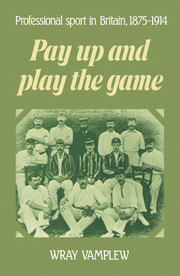Book contents
- Frontmatter
- Contents
- List of tables
- Preface
- Acknowledgements
- A guide to prices, 1870–1914
- Part I An overview
- Part II The development of professional gate-money sport
- 3 Popular recreation before the Industrial Revolution
- 4 Sporting activities and economic change, 1750-1830
- 5 The precursors of commercialised sport, 1830–75
- 6 The rise of professional gate-money sport, 1875–1914
- 7 From sports spectator to sports consumer
- Part III Sport in the market place: the economics of professional sport
- Part IV Playing for pay: professional sport as an occupation
- Part V Unsporting behaviour
- Part VI A second overview
- Appendices
- Notes
- Bibliography
- Index
6 - The rise of professional gate-money sport, 1875–1914
Published online by Cambridge University Press: 16 February 2010
- Frontmatter
- Contents
- List of tables
- Preface
- Acknowledgements
- A guide to prices, 1870–1914
- Part I An overview
- Part II The development of professional gate-money sport
- 3 Popular recreation before the Industrial Revolution
- 4 Sporting activities and economic change, 1750-1830
- 5 The precursors of commercialised sport, 1830–75
- 6 The rise of professional gate-money sport, 1875–1914
- 7 From sports spectator to sports consumer
- Part III Sport in the market place: the economics of professional sport
- Part IV Playing for pay: professional sport as an occupation
- Part V Unsporting behaviour
- Part VI A second overview
- Appendices
- Notes
- Bibliography
- Index
Summary
The standard of living in the years 1875-1914 has n o t received the attention given by historians to the Industrial Revolution period. There is, however, substantial agreement that real wages generally rose till about the turn of the century but then declined, interrupting a long upward trend which, on the basis of the most quoted estimate, had seen a rise of some 60% from 1870 to the 1890s. The extent of the decline should not be exaggerated as the average real wage between 1900 and 1913 still remained above that for the 1890s as a whole.
Nevertheless some caveats must be made. First, there are problems in the construction of the indices: recorded wage rates may not accurately reflect actual earnings and the budget weightings, especially those for rent, are imperfect. Second, it is clear that there were significant regional variations which are hidden in national figures. Finally, the experiences of different occupations varied according to the levels of cyclical and technological unemployment. Having said this, it must be emphasised that, unlike in the Industrial Revolution debate, there is no controversy that real wages generally increased in the last three decades of the nineteenth century.
Increased spending power made it possible for the working class to purchase more energy. In turn this encouraged two middle-class groups to attempt to persuade workers, or their children, to participate actively in sport.
- Type
- Chapter
- Information
- Pay Up and Play the GameProfessional Sport in Britain, 1875–1914, pp. 51 - 72Publisher: Cambridge University PressPrint publication year: 1988



